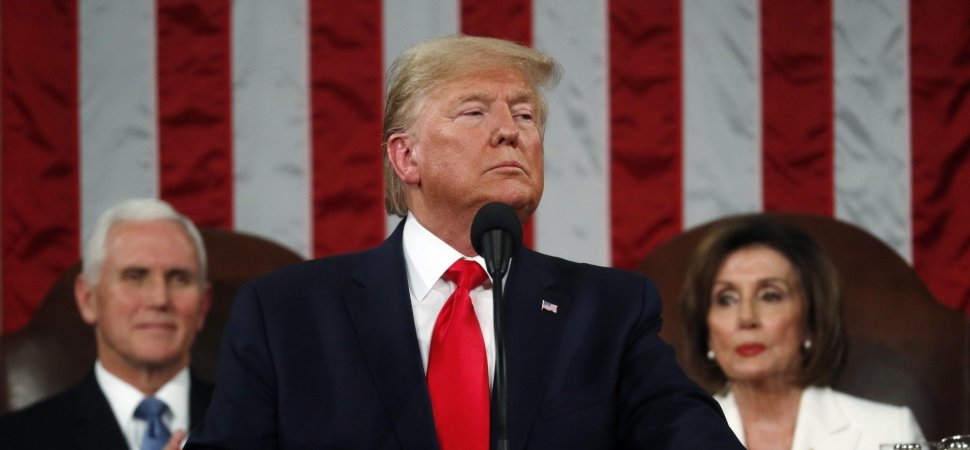Donald Trump’s State of the Union address Tuesday night unfolded against a backdrop of both high-stakes political drama (the impeachment trial) and farce (the clown car of an Iowa Caucus whose results dribbled in throughout the evening). Viewers able to divert their attention from those spectacles approached the President’s speech with the usual question raised by this annual event: What will he say that speaks to me?
For entrepreneurs and small-business owners the answer was: not a lot.
In his 2017 State of the Union address, President Trump announced his small-business-friendly war on regulation–a pledge to scrap two rules for every one rule created–and a collaboration with Canada to empower women entrepreneurs. In 2018, he invited the sibling co-founders of a manufacturing company in Ohio to sit with the First Lady during a speech that proclaimed small-business confidence to be at an all-time high and lauded the effects of his tax cuts on those companies.
But in last year’s speech, references to small business–beyond a hat tip to cuts in the estate tax–were thin on the ground. And although this year roughly the first 12 minutes of the address focused on the economy, the role and challenges of small business were virtually ignored. “Outside of the cheerleading about the economy, I heard nothing in the SOTU that was specifically relevant to America’s small businesses,” says Andrew Shotland, CEO of Local SEO Guide, a search engine optimization business based in Pleasanton, California. “It was all about looking backwards.”
So, for example, the President spent almost three minutes ticking off the record-low unemployment rates of a long list of populations–African Americans, Hispanic Americans, Asian Americans, women, veterans, people with disabilities, workers without high school diplomas, and young people–with no mention of the new and growing businesses that create the majority of those jobs.
Similarly, Trump touted the effectiveness of the opportunity zone program, which was implemented as part of his 2017 tax cut, for bringing jobs to neglected neighborhoods. But “there was remarkably no mention of entrepreneurship, which was supposed to be the motivating purpose of opportunity zones,” says John Dearie, president of the Center for American Entrepreneurship, a nonpartisan research and policy organization that advocates for growth companies.
The President introduced Tony Rankins, a formerly drug-addicted Army veteran with PTSD who received training and a job through a business that invests in opportunity zones. But Trump barely mentioned the business, and didn’t even name it. (That would be R Investments, a real estate investment company based in Denver with a social mission to rehabilitate and employ the homeless.) A previously announced guest at the speech was Paul Morrow, founder of SDAC, a concrete manufacturing company that supports several new F-35 jets and is based in an opportunity zone in Montgomery, Alabama. Morrow never even got introduced.
Trump took credit for replacing Nafta with the United States-Mexico-Canada Agreement, which for entrepreneurs “was a really big deal because it provides these businesses with consistency,” says Thad Inge, government relations manager at Paychex, a Rochester, New York-based provider of payroll, human resources management, and other services to small companies. What Trump didn’t mention: The USMCA is the first U.S. trade agreement with a section specifically targeting small and medium-size exporters.
The President did make passing references to a couple of more general issues that should appeal to entrepreneurs, including a plan to offer vocational and technical education in every U.S. high school and efforts to bring down drug prices to make health care more affordable.
Reactions to the speech among entrepreneurs naturally varied by industry. Lloyd Brown says he has observed what Trump called a “blue-collar boom” of employment among low-income workers in Amarillo, Texas, where his $76 million company, Smart Chemical Solutions, is based. SCS is a service provider to the oil and gas industries, whose rising fortunes, touted in the address, “have led to all-time lows in unemployment in Texas,” Brown says. Speaking for himself, Brown says the President’s emphasis on reducing regulations to achieve energy independence “has positively impacted my employees, company, and family.”
Jason Martin has had a different experience. Iotum, Martin’s $5 million teleconference company based in Los Angeles and Toronto, has suffered from changes under Trump’s FCC that eliminate regulations for large incumbent internet service providers. “I’m forced to lay people off because of the policies of this man,” says Martin, who was unable to sit through more than half of the address. “He’s forcing small businesses out of business because of his fondness for big businesses like AT&T. This is gross.”
Published on: Feb 5, 2020
